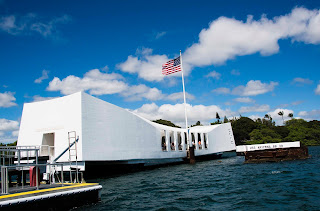War is caused either by an imperialistic stance by an
aggressor, a failure of nations to successfully negotiate their differences, or
a combination of the two, which is how the United States ended up in World War
Two.
When Japan invaded Manchuria (imperialism), the United
States reacted by refusing to sell Japan oil. This was no small matter for
Japan, who bought 80% of its oil from U.S. companies. When the terms the U.S.
required to begin shipping oil to Japan were too high for the Japanese
government to accept and still maintain face—a commodity more important to
politicians than to the millions of regular people who suffer when nations
resort to war—Japan attacked the U.S. at Pearl Harbor on a date that FDR
decried would live in infamy.
In two hours, Japan sank most of our battleships, numerous
other vessels, and killed 2,400 people. As battles go, the material losses were
major (although temporary, as most of the battleships were raised to fight
again). In comparison to other battles, the human loss was small. On a single
day at the battle of Antietam (Sharpsburg, MD) nearly 23,000 soldiers died. The
atomic bomb dropped at Hiroshima killed over 40,000 people that day and 50,000
-100,000 more in the next four months.
I know all those statistics, but what resonated most with me
as I toured Pearl Harbor, part of the World War II Valor in the Pacific
National Monument (including the USS Arizona memorial), is the virulent hate so
many immediately felt toward those of Japanese heritage living in the United
States. In Executive Order 9066, FDR set in motion what would become the mass
internment of Americans with Japanese ancestry. In the mainland U.S., over
100,000 were interned. In Hawaii, with a population of over 150,000 individuals
with Japanese ancestry, fewer than 2,000 were interned!
Did you know the disparity of treatment of between locations?
I did not. This was racism, pure and simple.
Fear allows presidents to take actions that would otherwise
be unconstitutional. FDR subjected citizens of Japanese ancestry to the loss of
property, freedom, all citizen rights, simply because of fear that they might conspire against their country.
President Lincoln suspended habeas corpus soon after the start
of the hostilities now referred to as the Civil War, the War Between the
States, or the War of Northern Aggression. The Judiciary determined that the
right to suspend habeas corpus resided in Congress, not the President. Lincoln
ignored the court order.
Lincoln was wrong to ignore the courts. FDR was wrong to tar
all those with Japanese heritage with a single brush. Yet, in surveys, Lincoln
and Roosevelt are considered two of our greatest presidents. For example, in
the Siena College Research Institute, Presidential Expert Poll of 2010, Lincoln
was rated #3, FDR was #1[1].
During the McCarthy era, political persuasion (and sometimes
only presumed political persuasion) was cause for citizens to lose their jobs,
to be blacklisted by industries regardless of whether they had ever committed any
act against the interests of the United States.
This is our past. We should not run away from it. We must
remember it to avoid repeating it.
We feared Native Americans and tried to exterminate them, or
at least confine them to reservations. We feared Southern sympathizers and
allowed presidential power to trump the checks and balances of our three
branches of government. We feared the Japanese and illegally interred 100,000
fellow Americans.
Our current president uses fear of race, religion, and
national origin to pit U.S. citizen against U.S. citizen. In our society, I am
lucky to be privileged: an Anglo-Saxon male with sufficient financial means
that I don’t need to rely upon charity to live. From the perspective of those
in power, I should be concerned about losing all that I value because of the
growing influence of those who are “not our kind.”
They are correct that I am concerned about losing what I
most value. However, we have very different concepts about what has greatest
value.
If I do not stand with Muslims and Jews and Blacks and Mexicans,
if I do not stand with the poor regardless of race or religion; if I don’t
object when others’ rights are diminished in response to fear promulgated for
political gain; if I allow anyone to trample the inherent worth and dignity of another,
I have lost my own soul.
~ Jim
This blog first appeared on the Writers Who Kill Blog 3/26/17
This blog first appeared on the Writers Who Kill Blog 3/26/17
[1] https://en.wikipedia.org/wiki/Historical_rankings_of_presidents_of_the_United_States#Siena_College_Research_Institute.2C_Presidential_Expert_Poll_of_2010



No comments:
Post a Comment